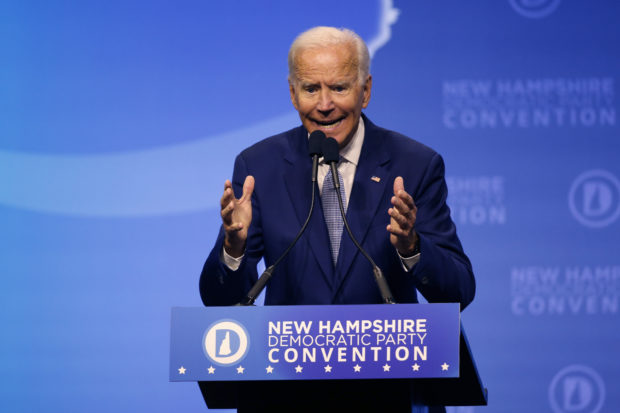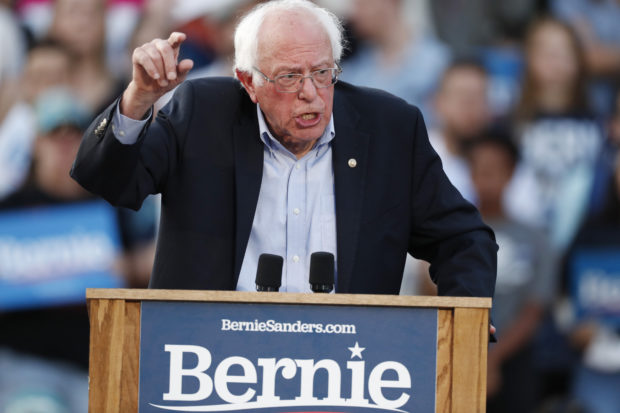Democrats’ Strategy to Change Criminal Justice Laws
Every top Democratic presidential contender is touting a detailed overhaul of the criminal justice system to end rules and practices that have been blamed for the mass incarceration of a generation of African Americans.
The proposals illustrate the influence of black voters in the primary and reflect Democrats’ refusal to cede any ground with them to President Donald Trump, who has also sought to highlight his efforts to change the justice system.
The ideas from Democrats range from ending requirements that bail is paid in cash which opponents decry as a driver of unnecessary incarceration to an end to the federal death penalty, which Trump recently reinstated.

Democratic presidential candidate former Vice President Joe Biden speaks during the New Hampshire state Democratic Party convention, Saturday, Sept. 7, 2019, in Manchester, NH. (AP Photo/Robert F. Bukaty)
Here’s a look at how the leading candidates approach some major elements of the nation’s criminal justice system:
MASS INCARCERATION
Bernie Sanders rolled out his plan in South Carolina, a critical early-voting state where the majority of the Democratic primary electorate is black.
The Vermont senator told The Associated Press that his chief priority is significantly reducing the country’s prison population, using a combination of remedies that include a $25 billion investment in combating homelessness and local-level law enforcement reforms that he hopes will create stronger ties and fewer misunderstandings between law officers and the communities that they serve.

Democratic presidential candidate South Bend, Ind., Mayor Pete Buttigieg speaks during the New Hampshire state Democratic Party convention, Saturday, Sept. 7, 2019, in Manchester, NH. (AP Photo/Robert F. Bukaty)
“Lethal force must be the last response, not the first response,” Sanders said.
His rivals have their own visions to make a dent in the nation’s incarcerated rate, which ranks as the highest in the world.
Former Vice President Joe Biden, after taking heat from Democratic opponents for championing a hawkish crime bill in the 1990s, pitched a left-leaning plan that declares “no one should be incarcerated for drug use alone,” instead routing those infractions to drug courts or treatment.
California Sen. Kamala Harris, who released a criminal justice plan ahead of Thursday’s presidential debate, is calling for a national commission to study how to reduce mass incarceration and recidivism while still holding offenders accountable.
She calls for ending private prisons, legalizing marijuana and ending the federal sentencing disparity between powder and crack cocaine.

Democratic presidential candidate Sen. Kamala Harris, D-Calif., speaks during the New Hampshire state Democratic Party convention, Saturday, Sept. 7, 2019, in Manchester, N.H. (AP Photo/Robert F. Bukaty)
Harris, Sanders, Massachusetts Sen. Elizabeth Warren, and Pete Buttigieg all propose removing decisions about using the president’s clemency powers from the Justice Department, while Biden proposes using clemency powers “broadly,” as former President Barack Obama did.
For his part, New Jersey Sen. Cory Booker proposes a clemency initiative that his campaign projects would release from prison more than 17,000 individuals, many of them incarcerated for nonviolent drug crimes.
All of the five top Democratic candidates also have vowed to slash or end federal mandatory minimum sentencing rules that critics blame for the excessive incarceration of nonviolent offenders.

Democratic presidential candidate Sen. Elizabeth Warren, D-Mass., speaks at the New Hampshire state Democratic Party convention, Saturday, Sept. 7, 2019, in Manchester, NH. (AP Photo/Robert F. Bukaty)
POLICE MISCONDUCT
The Trump administration has limited the use of consent decrees and other Justice Department tools to enact major change within police departments following allegations of excessive use of force or other incursions on civil rights.
Most of the leading Democratic candidates specifically say they would restore previous policy on consent decrees to empower stronger federal oversight of police departments, while Sanders’ plan goes even further by committing the attorney general to an investigation of any death that occurs in police custody.
Buttigieg does not directly cite consent decrees in his sweeping anti-racism agenda.
The mayor of South Bend, Indiana, who faced intense scrutiny back home after the fatal shooting of a black man by a white police officer, proposed crafting legislation that would raise the bar for the use of lethal force by police officers, in addition to multiple other measures designed to increase responsiveness and community involvement by police departments.
Buttigieg’s criminal justice plan, like Sanders’ and Warren’s, directly criticizes the so-called “broken-windows” tactic, which encouraged police departments to pursue punishments for minor crimes that might deter major ones.
Booker hired a police director during his term as mayor of Newark, New Jersey, who embraced that theory.

Democratic presidential candidate Sen. Bernie Sanders, I-Vt., speaks during a rally at a campaign stop Monday, Sept. 9, 2019, in Denver. (AP Photo/David Zalubowski)
Harris is calling for independent investigations of officer-involved shootings, wants to incentivize police departments to adopt a national standard for the use of force, and would reinstate Obama’s executive order that prohibited sales of certain military equipment to local police departments.
INSIDE THE COURTROOM
Biden, Warren, and Sanders all devote part of their platforms to aiding the nation’s strained corps of public defenders, while Harris has proposed her own $250 million grant program designed to improve working conditions for lawyers who help those who can’t afford representation on their own.
Warren’s criminal justice plan further pitches an expansion of the right of accused individuals to challenge their imprisonment, also known as the right of habeas corpus. And she joined Sanders and Biden in a commitment to reining in prosecutorial overreach: Warren would create a dedicated Commission on Prosecutorial Conduct, among other changes.
Biden would examine prosecutorial decision-making through an independent task force, while Sanders’ slightly different approach includes a vow to restrain prosecutorial immunity for decisions they make on the job.
___
Associated Press writer Meg Kinnard in Columbia, South Carolina, contributed to this report.

